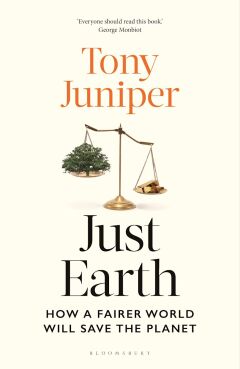The growing environmental catastrophe demands the total mobilisation of government and society.
Review of Just Earth by Tony Juniper
Reviewed by David Towell
I have some young friends in primary school. They like dinosaur jokes. One of these is regularly published in cartoon form... except it is not a joke. Two dinosaurs are looking to the sky and see the large meteorite that will end their global dominance as well as much else. One is saying to the other ‘At least we didn't know this was coming’.
Tony Juniper is an environmental scientist and lifelong campaigner who now finds himself chair of the governmental agency Natural England after a number of significant roles in NGOs including Friends of the Earth. In these roles he has been at least in the corridors of several meetings intended to promote global action to address the human-created climate and biodiversity catastrophe that is rapidly overtaking us. He has watched the compromises made by governments, the way corporate pressures are mobilised...and how representatives of indigenous peoples and others who are early victims of this catastrophe get walk-on parts. He is well-placed to tell the story of our collective failure to properly address these challenges over the last half Century and identify what now must be done if we are not to join the dinosaurs.

There are four parts to his analysis. First, Juniper brings together a well-evidenced account of these multiple environmental and social challenges and their major (and typically inter-related) causes. Much of this will be familiar but worth repeating. Man-made climate change is progressing dangerously. Atmospheric carbon dioxide and other 'greenhouse gases' are still accumulating, the climate is getting hotter, extreme weather events are much more frequent, sea levels are rising and natural diversity is rapidly declining. As a consequence, drought is seriously damaging food production in many poorer parts of the world and this together with extreme temperatures is forcing population migration and associated conflict.
Industrialisation and the use of fossil fuels in the 'developed' countries was central to both greenhouse gas growth and the rapid exploitation of natural resources, the latter then and now often in 'developing' countries. Since the 1950s at least, these processes have accelerated as we see in population growth, rising consumption of material goods, waste and pollution.
Food production has also been industrialised with attention to cheapness rather than nutritional quality or sustainable use of the land and sea. Accordingly demand of all kinds has expanded beyond the capacity of the Earth's living systems and resources, especially if the world's population wants to consume like those of us in the 'rich' countries, or indeed the elites in all countries. Underpinning all this, the global capitalist system makes shareholder value the primary objective for corporations and facilitates the concentration of wealth, while governments typically see GDP growth as their central economic goal.
But it is worse than this! Juniper's second main contribution, captured subtly in his main title and more clearly in the sub-title, is to bring together environmental and social challenges within a common framework and show that we need to address both if we are to shape a better future, locally and globally.
On the one side, both within countries and between them, it is poor and otherwise disadvantaged people who suffer the negative effects of environmental damage first and hardest. In the UK, for example, think about who is impacted most by pollution, unhealthy food, poor housing, lack of green spaces etc. and look at what is happening to relative life expectancy. On the other side, growing inequality has a corrosive effect on the solidarity required for societies to deal with collective challenges. Greater fairness and a focus on improving everyone's quality of life is necessary to engage widespread action and strengthen support for change.
Third, what is to be done? Juniper uses this analysis to set out a radical policy programme, focusing here on over-consuming and over polluting rich countries like the UK. He makes use of the concept of mission economics developed by Mariana Mazzacuto but rather than her moon shot example, he argues that the scale and urgency of these challenges require something more like the total mobilisation last seen in WWII, albeit this time we are waging a struggle from which we all can benefit. His ten main proposals include that government replaces GDP as a key indicator with a multi-dimensional measure of progress that addresses what the New Economics Foundation calls the 'triple bottom line' i.e. economic, environmental and social outcomes. Guided by this framework and with additional finance derived from taxing wealth, a mission-oriented government needs to lead investment in creating a sustainable and just future, taking account of the employment implications of changing technologies. In turn, partners in this new economy - investors (like pension funds), banks, insurance companies and corporations - need to redefine their purpose towards creating value for society. The law can also help to establish and uphold everyone's right to live in a healthy environment.
Finally, Juniper recognises that all of this is a 'very big ask': it would shift the fundamentals of the modern economic system that is itself maintained by, and also maintains the political structures in our societies, the means by which we get to understand what is happening and an implicit culture which identifies humankind as somehow separate from and above the rest of the natural world of which we are part.
Nevertheless he remains hopeful! Juniper concludes:
“What is needed now is for a new idea to take hold, based on new measures of progress, the fair allocation of resources, respect for ecological boundaries and opportunities for all... Thrivalism is a one-word way to describe it.”
Just Earth should inspire a lot more thrivalists.
The publisher is Bloomsbury. Just Earth: How a Fairer World will Save the Planet © Tony Juniper 2025
Review: Just Earth © David Towell 2025
nature & economics, social justice, Sustainability, England, Reviews